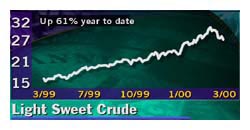|
Kandel on oil
|
 |
March 29, 2000: 4:42 p.m. ET
Tepid OPEC move to slightly increase production could hurt U.S. economy
By CNN Financial Editor Myron Kandel
|
NEW YORK (CNNfn) - Will high oil prices undermine the American economic boom? Not now.
Could they? Yes.
That's why the decision by OPEC to increase production by only 1.7 million barrels a day - even after Iran's reluctant move to go along - represents a failure by the Clinton Administration that some day could come back to haunt the U.S. economy.
The Administration had been pushing hard through diplomatic channels for an increase of between 2 million and 2.5 million barrels, and it's trying to put a good face on the OPEC move. But while the oil cartel's smaller increase will indeed send gasoline prices lower by summer, Washington's inability to obtain even more production poses some potential long-range dangers.
 The steep rise in oil prices over the last year is just beginning to spread beyond the gas pump, home heating oil and airline fares to other segments of the economy. That will inevitably send prices higher and push inflation up at a time when the Federal Reserve - despite the absence of inflation - has already been increasing interest rates. The steep rise in oil prices over the last year is just beginning to spread beyond the gas pump, home heating oil and airline fares to other segments of the economy. That will inevitably send prices higher and push inflation up at a time when the Federal Reserve - despite the absence of inflation - has already been increasing interest rates.
The Fed has been trying to cool off a red-hot economy without sending it into a tailspin. Its task is delicate enough, without the heavy hand of OPEC's production restraints interfering with a free market. But all this is taking place in the context of a booming economy. A slowing economy will reduce the demand for oil, but OPEC isn't noted for the delicacy of its pricing decisions.
Iran - no friend of the United States - thumbed its nose at Uncle Sam, and only joined Tuesday's increase after it became clear that the rest of OPEC had decided to go ahead without it. Iran knows enough about the global oil industry to be concerned about market share. OPEC usually operates on the concept of consensus, but it wasn't going to let Iran hold it - and the rest of the industrialized world - hostage to its recalcitrance.
But despite the diplomatic pressure it exerted, Washington failed to flex its economic muscle when it came to getting OPEC to relax its production cutbacks. There are strong pros and cons to tapping the nation's strategic petroleum reserve. But despite the negatives, such action - either real or threatened - would have sent a strong message to the members of the oil cartel about how serious the Administration considered the huge rise in oil prices over the last year to be and how willing it was to take strong action to deal with it. That message would have resonated not only for now, but for the future as well.
 True, prices had dropped to unsustainably low levels and a bounce-back was inevitable. But a tripling in price in just a year is unacceptable, particularly because it resulted not from the operation of a free market, but from the machinations of a cartel. True, prices had dropped to unsustainably low levels and a bounce-back was inevitable. But a tripling in price in just a year is unacceptable, particularly because it resulted not from the operation of a free market, but from the machinations of a cartel.
Ironically, that cartel was aided and abetted by one of our closest friends and major trading partners. It was Mexico's agreement with Saudi Arabia and Venezuela to curtail production that set the stage for OPEC's reduced quotas. And even after Tuesday's OPEC decision, Mexico - not a member - said it was raising its production less than half the amount it originally cut back.
OPEC's decision, welcome as it is, is too little and too late. The Clinton Administration needs to keep pressure on our friends in the cartel and on our neighbor to the south to make sure that prices reach a reasonable level on the way down and do not spike so sharply upward again.
(Myron Kandel is CNN's Financial Editor. His column will appear every Wednesday on CNNfn.com.) 
|
|
|
|
|
 |

|

